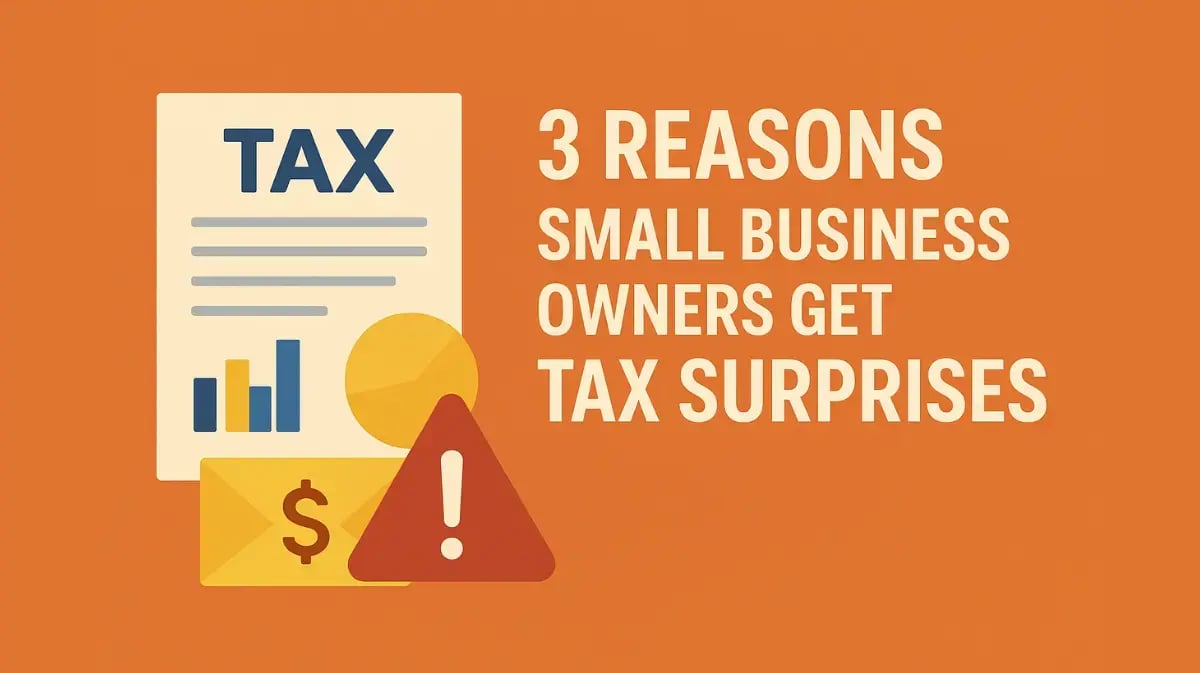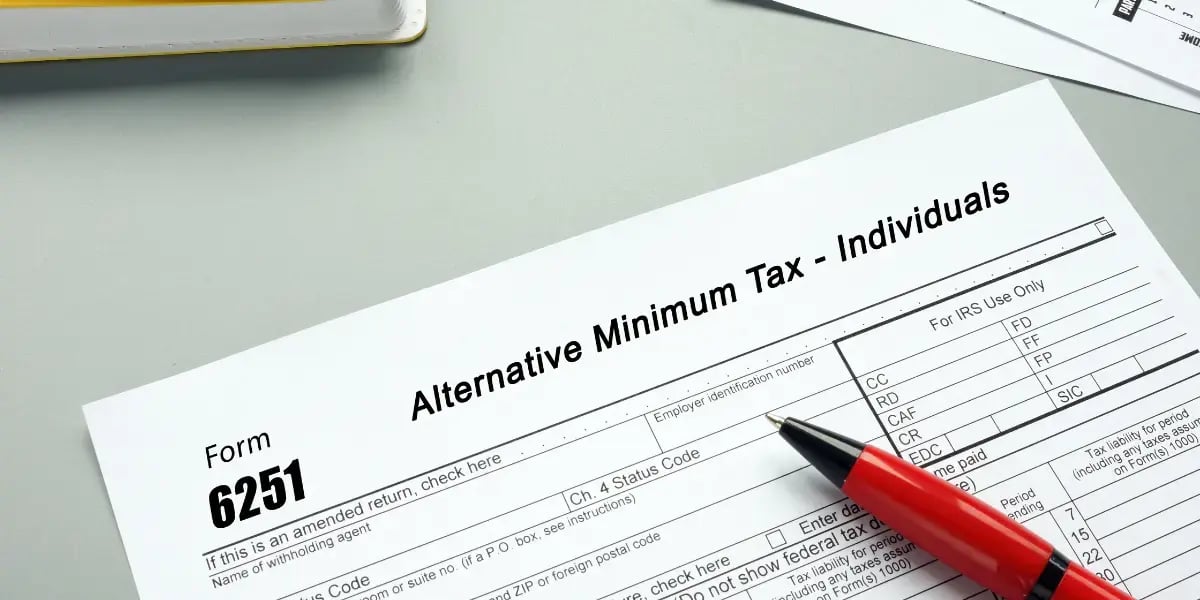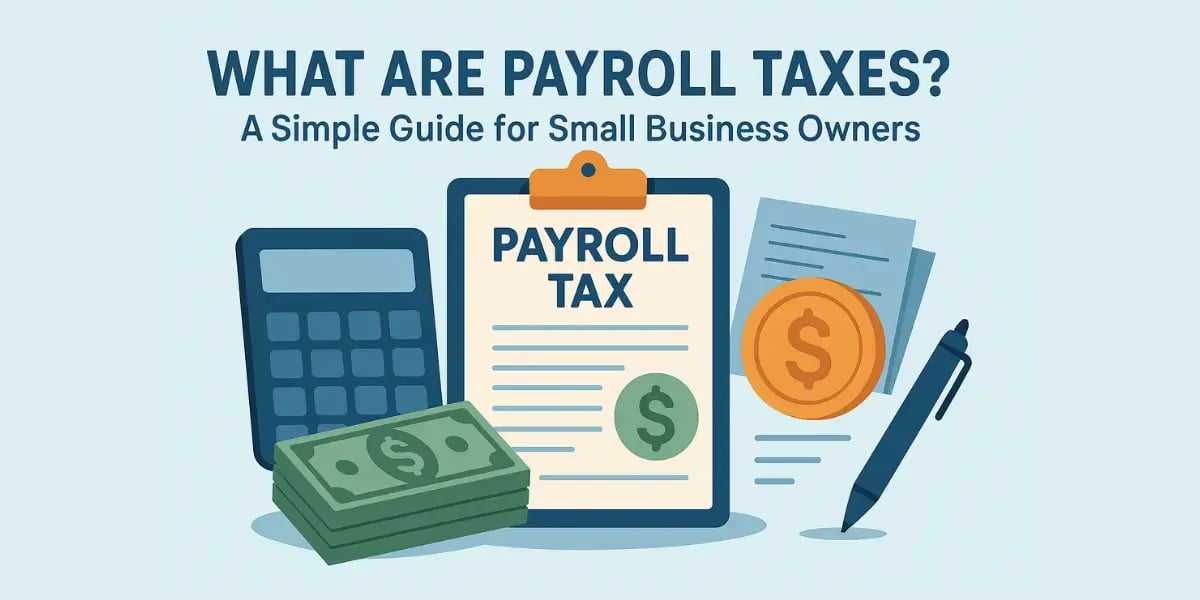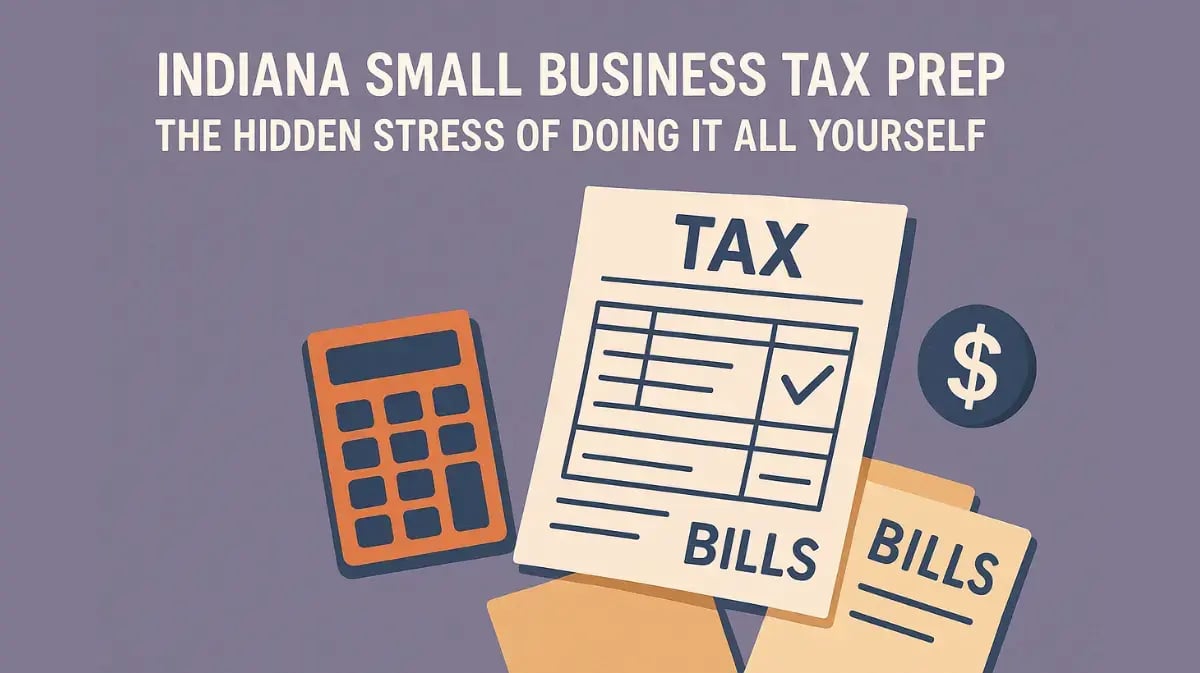3 Reasons Small Business Owners Get Blindsided by Taxes
May 5th, 2025
5 min read

Imagine this: You’ve wrapped up a successful year. Sales are up, customers are happy, and you’re feeling confident about your business. Then, tax season rolls around, and you get hit with a huge, unexpected tax bill. Suddenly, all that progress feels like it’s slipping away.
Sound familiar? You’re not alone. Tax surprises are common for small business owners, but they’re also avoidable. Many small business owners face these problems because they don’t fully understand the tax rules that apply to their businesses. The good news is that you can alleviate these surprises with a little planning and the right guidance.
Let’s take a closer look at the three biggest reasons small business owners get hit with unexpected tax bills — and what you can do to prevent them.
1. Ignoring Estimated Tax Payments
Many small business owners don’t realize they may need to make quarterly estimated tax payments to the IRS. Unlike W-2 employees, whose taxes are withheld from every paycheck, business owners are responsible for calculating and paying their taxes throughout the year. If you don’t pay enough, you could face penalties and interest charges when you file your annual tax return.
Why It Happens
Many business owners underestimate their income or fail to adjust their estimated tax payments when their earnings change seasonally. This is especially common for businesses with inconsistent cash flow, like restaurants or service providers with busy and slow seasons.
New business owners are often caught off guard because they don’t realize that estimated tax payments are required. Unlike W-2 employees, whose taxes are automatically withheld, business owners may be responsible for setting aside money and making payments throughout the year.
How to Avoid It
The rules for calculating estimated taxes can be confusing. Income often fluctuates from quarter to quarter, making it difficult to predict how much you owe. Without professional guidance, it’s easy to underpay, leading to penalties and an unpleasant surprise come tax season.
Working with an accountant who can help you calculate accurate quarterly payments is essential to avoid issues with estimated tax payments. An experienced accountant can analyze your income patterns and help you set aside the right amount each quarter.
Setting calendar reminders for tax deadlines is another simple but effective strategy. The IRS expects quarterly payments on April 15, June 15, September 15, and January 15. By marking these dates in your calendar, you can stay ahead of deadlines and avoid late payment penalties.
Adjust your estimated payments if your business income increases mid-year, for example, during a busy season. Updating your payment amounts based on actual income helps prevent a large tax bill (and possible penalties) at the end of the year. Taking these steps will keep you on track and help you avoid costly surprises.
2. Misreporting Income and Expenses
Accurate reporting is essential when it comes to taxes. Misreporting income or expenses — even by accident — can trigger audits, penalties, and unexpected tax bills. One common mistake is mixing business and personal expenses.
Why It Happens
Many business owners make the mistake of mixing personal and business expenses. They might use a personal credit card to cover business costs or deposit business income into a personal account. This creates confusion when it’s time to file taxes and makes it harder to track deductible expenses accurately.
Cash income is another common source of trouble. Not all business owners properly report cash payments because they forget or assume small amounts don’t matter. However, failing to report all income can lead to penalties and increased scrutiny from the IRS.
Incorrect 1099 forms from clients and vendors can also cause problems. If a client reports a different income amount than you have recorded, it can create a mismatch in the IRS’s system. This may trigger an audit or result in an unexpected tax bill. Keeping detailed and accurate records helps prevent these issues.
How to Avoid It
To avoid confusion, open a separate business bank account and credit card. Keeping business and personal finances separate makes tracking expenses, identifying deductions, and providing accurate records easier if the IRS audits your business.
Using accounting software like QuickBooks is another smart move. It helps you track all income and expenses in one place, categorize them correctly, and generate reports to simplify tax preparation. Automation reduces the risk of errors and ensures you have a clear picture of your business finances.
Finally, double-check any 1099 forms you receive from clients or vendors. Make sure the amounts reported match your own records. If there’s a discrepancy, contact the client immediately to correct it before it leads to a tax issue. Staying organized and proactive will help you avoid costly mistakes when tax season rolls around.
3. Overlooking Deductions and Credits
Tax deductions and credits are valuable tools for reducing your tax bill, but many small business owners don’t take full advantage of them. Why? Because they don’t know what they qualify for, or because they fail to keep proper records.
Why It Happens
Many business owners overlook smaller expenses, assuming they aren’t significant enough to matter. However, these small costs — like office supplies, software subscriptions, or travel expenses — can add up over time. Failing to track them means missing out on valuable deductions that could reduce your tax bill.
Another common issue is a lack of awareness about tax credits designed for small businesses. There are credits available for things like hiring employees and offering health insurance, but many business owners simply don’t know they exist.
Without professional guidance, it’s easy to miss these opportunities. An accountant can help identify available credits and ensure you claim all the deductions you’re entitled to. Working with an expert can make a significant difference in lowering your tax burden versus going at it alone.
How to Avoid It
Keep detailed records of all business-related expenses to avoid missing out on deductions. This includes home office costs, travel, equipment purchases, and even smaller items like office supplies and software subscriptions. Good recordkeeping helps you accurately claim every eligible deduction when tax season arrives.
Researching available tax credits is also important. There are valuable credits for hiring employees, investing in energy-efficient upgrades, and offering health insurance and employee benefits. Taking advantage of these can significantly reduce your tax bill, but you need to know they exist in order to claim them.
Finally, working with an accountant who understands small business tax laws is one of the best ways to maximize your deductions. A professional can help you navigate complex tax rules, uncover opportunities you might have missed, and make sure you’re not leaving money on the table.
Avoid The Kinds of Surprises Nobody Enjoys
Tax surprises can feel like a major setback, but they don’t have to be part of your business journey. Most unexpected tax bills come down to three common issues: missed estimated payments, reporting mistakes, and overlooked deductions. The good news is that these problems can be prevented with the right knowledge and a little preparation.
You can take control of your taxes by staying on top of your quarterly estimated tax payments, keeping business and personal expenses separate, and tracking every possible deduction and credit. Working with a professional accountant can make a big difference, helping you navigate complex tax rules and avoid costly mistakes.
At TMA Accounting, we specialize in helping small business owners navigate the complexities of business taxes. If you’re tired of unexpected tax bills, contact us today. Let us help you take control of your taxes and set your business up for long-term success.
Blog Disclaimer: Nothing in this post constitutes legal, tax, or financial advice and is intended for informational and educational purposes only. This informational and educational material is not intended, and must not be taken, as legal, tax, or financial advice on any particular set of facts or circumstances or as recommendations that are suitable for any specific person. You need to contact a lawyer, accountant, or financial adviser licensed in your jurisdiction for advice on your specific questions, issues, and concerns. View our full Terms of Use here.
Topics:























